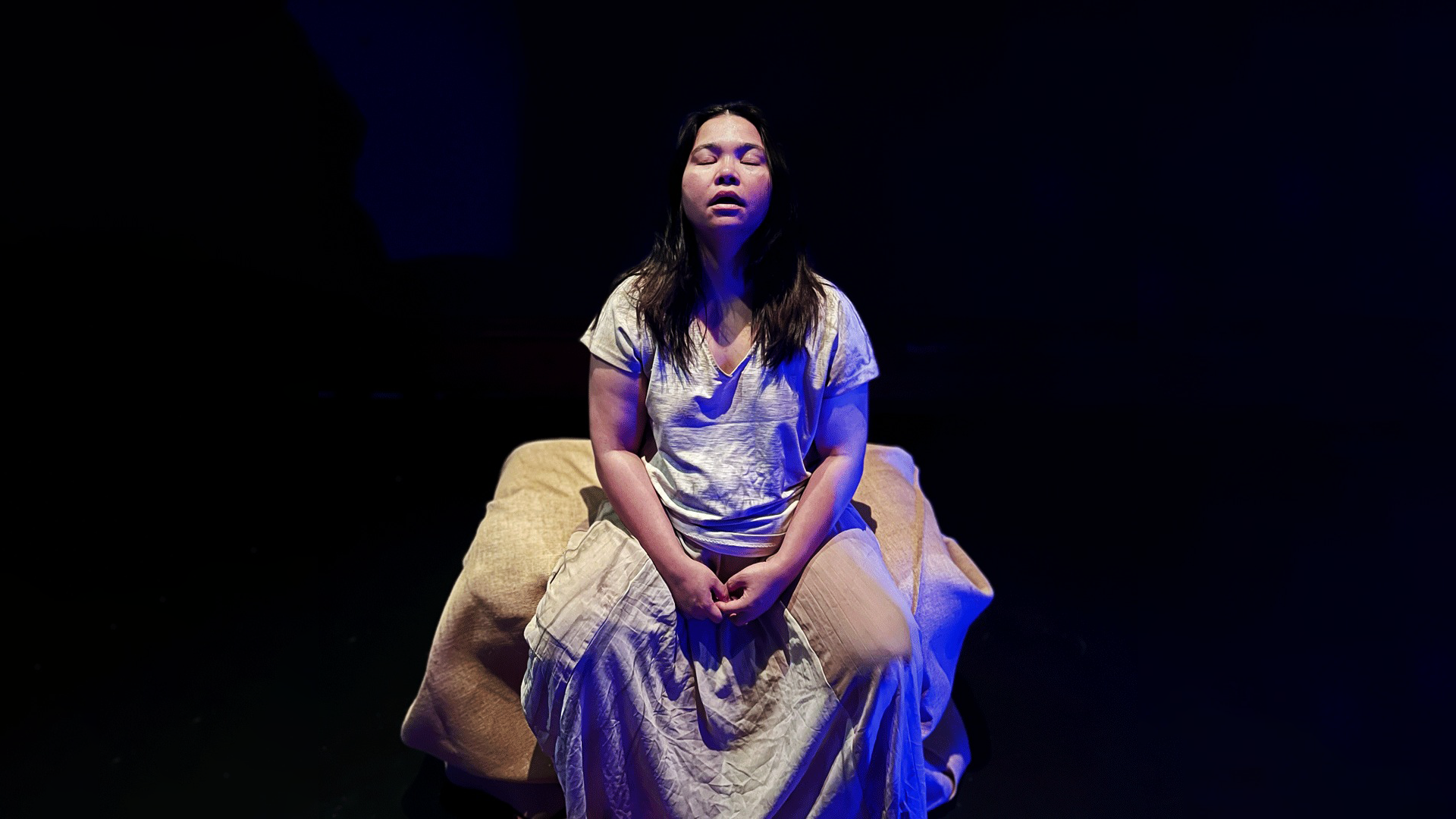REVIEW: Aswang’s Shape-Shifting Brilliance and Feminist Core
Aswang is an adaptation of Rody Vera’s Palanca Award winning Ang Unang Aswang, co produced by Divergent Theatre Collective and presented as part of La Mama’s Festival of Mother Tongues between 15 - 17 November. This production was staged at La Mama Courthouse.
Language: English and Filipino (Tagalog dialect)
Directed by: Ricardo Magno
Performed by: Mayen Estanero
Dramaturgy by: Enya Daly
Production Design: Atulya Mohan
Additional Design by: Kiki Ando
Lighting Design: Gabriel Bethune
Sound Design by: Miles Cosmo Phillip
Creative Consultant: Zachary Dunbar
Reviewed by: Angelica Ignacio
Mayen Estanero stars in the monodrama Aswang. Presented with La Mama’s Festival of Mother Tongues 2024. Image by Georgina Capper.
Ricardo Magno’s monodramatic adaptation of Rody Vera’s Palanca award winning play delivers a visceral and harrowing theatrical experience. Presented by Divergent Theatre Collective as the Filipino offering for La Mama’s inauguaral Festival of Mother Tongues, Aswang takes Philippine folklore to deliver confrontational truths about innocence corrupted by the patriarchy’s violent nature.
Aswang follows a girl raised by the forest, whose curiosity about the civilised world leads her to meet a domineering policeman from a nearby village. This powerfully transformational encounter becomes the catalyst for the birth of the Aswang, a shape-shifting harbinger of evil and the most feared creature in Philippine Mythology.
This marks the second collaboration between Magno and lead actress Mayen Estanero, with an initial adaptation delivered as a part VCA’s Masters Showcase in 2023, a show I was fortunate enough to attend. In saying this I had anticipated that this iteration would be performed completely in Tagalog, given how most shows in the festival seems to have fully committed to performing in their native languages.
However, by the time we are launched into the play’s volcanic second act and fateful meeting between Forest Girl and Policeman, it becomes clear why this is a deliberate direction from Magno. Not only does it underscore the alienation and naivety of Forest Girl (who speaks only in English) there is an elevated sense of overwhelming dread when Estanero assumes the stance of foreboding policeman, gun aimed, speaking Tagalog with the sway and confidence of a man drunk with power.
This language divide heightens the tension, particularly for Filipino audiences who catch the nuances of the policeman’s cadence --- a chilling echo of former President Rodrigo Duterte’s strongman rhetoric, whose administration is steeped in the legacy of extrajudicial killings, police brutality and an exponential rise in gun related violence.
The internet is not short of Filipino men who have gone viral during Duterte’s rule over heated confrontations (sometimes lethal rages) about traffic, land or something as mundane as parking spaces. If you can find one, any single one, you’ll find that Estanero makes an unmistakeable mimicry of these men.
It is here in this subtle detail where I think Magno’s brilliance as a director truly shines.
Mayen Estanero’s performance is nothing short of masterful. Portraying five distinct characters – from the eerie Black cat to the grieving Mother Boar, to innocent Forest Girl to the sinister Policeman-- she transitions with seamless precision, embodying each role with unrelenting intensity. The word ‘Alchemical’ comes to mind.
Whether under Magno’s direction or her own choice, Estanero spoke her English lines (specifically for Forest Girl) with an Australian accent rather than reflecting the linguistic inflections abundantly found across the Philippines. These inflections carry a deeply rich context, revealing nuances of geographical and socioeconomic backgrounds that I felt would have elevated the story.
In this case, the Australian accent swallows the power of this specific quality of Filipino expression and voice. Estanero’s talent and mastery as an actress is extraordinary and when her voice breaks from the restrictions of the Australian tongue, her storytelling becomes genuinely transcendental.
While La Mama’s Festival of Mother Tongues provides a platform for artists to rise above barriers of language and communication, the issue touches on a broader challenge of assimilation that many international artists who have immigrated to Australia know all too well.
Atulya Mohan’s minimalist production design compliments the expansive physicality of Estanero’s performance. Miles Cosmo Philipp’s sound design evokes in me the nostalgia of provincial living in rural Philippines, while Gabriel Bethune’s hauntingly atmospheric lighting, though effective, could benefit from greater consistency in Act 2.
For as long as storytelling has been around, Women, and our bodies have been conduits for cautionary tales of how our lives seem to be at the mercy of the patriarchy that surrounds us, and Aswang is ripe with examples: A mother killed in the forest, a baby girl left for dead, girls assaulted in the dark.
At it’s core, Aswang redifines the cautionary tale, shifting focus from what women should avoid and how they can make themselves small, to the systems of power they must confront. Through unflinchingly brave storytelling, it repeatedly unmasks and courageously names the true monsters among us, offering audiences a powerful invitation to hold it accountable.
This kind of culturally rich, impactful storytelling is exactly what Melbourne’s theatre scene needs and if the number of those in attendance of Friday’s premiere are an indication of anything, it is the kind of entertainment communities are hungry for. La Mama’s uplifting commitment to boundary-pushing independent theatre is exemplified by The Festival of Mother Tongues. They are a foundational pillar crucial to championing voices not often heard and their upcoming pause in operations for 2025 will be a deeply felt absence for the industry. For independent and emerging artists alike.
This review is part of MAV’s initiative to foster culturally responsive theatre criticism, amplifying diverse voices and perspectives in the arts. By inviting writers, storytellers and artists to review the works of fellow creatives through the lens of shared lived, or cultural experiences, we aim to highlight the importance of theatre reviews that challenge dominant narratives and provide deeper, culturally grounded perspectives.

